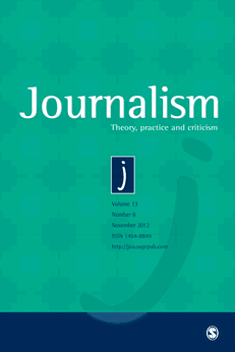
Journalism
Scope & Guideline
Exploring the Frontiers of Media and Society
Introduction
Aims and Scopes
- Investigative Journalism and Ethics:
This area explores the ethical implications and challenges faced by journalists in their investigative work, emphasizing the importance of integrity and accountability. - Digital Journalism and Technology:
The journal examines how digital technologies are transforming journalism practices, including the rise of data journalism, automated reporting, and the impact of social media on news dissemination. - Audience Engagement and Perception:
Research in this scope delves into how audiences interact with news, their perceptions of credibility, and the effects of audience engagement on journalistic practices. - Global Perspectives on Journalism:
The journal provides insights into journalism practices across different cultural and political contexts, highlighting the unique challenges faced by journalists in various regions. - Social Justice and Representation:
This focus area addresses issues of representation in media, including gender, race, and social justice, aiming to understand how these factors influence journalistic narratives. - Journalism Education and Training:
The journal emphasizes the importance of education in shaping future journalists, exploring curriculum development and the integration of practical skills in journalism training.
Trending and Emerging
- Impact of Misinformation and Disinformation:
Research focusing on the challenges posed by misinformation and disinformation is increasingly vital, addressing how journalists navigate these issues in their reporting. - Mental Health and Well-being of Journalists:
There is a growing emphasis on understanding the mental health challenges faced by journalists, particularly in high-stress environments and during crises. - Innovative Journalism Practices:
The exploration of innovative practices, including solutions journalism and constructive journalism, is gaining traction as researchers seek to redefine the role of journalism in society. - Cross-border Journalism and Global Issues:
Emerging themes related to cross-border journalism reflect the interconnectedness of global issues, emphasizing the need for collaborative reporting across national boundaries. - Diversity and Inclusion in Journalism:
There is an increasing focus on how journalism addresses issues of diversity and inclusion, particularly in representation and coverage of marginalized communities. - Journalism and Artificial Intelligence:
The integration of AI in journalism is a burgeoning area of interest, examining how technology influences news production, distribution, and audience engagement.
Declining or Waning
- Traditional Print Journalism:
As digital media continues to dominate, the focus on traditional print journalism is decreasing, reflecting a shift in research priorities towards digital and multimedia journalism practices. - Local Journalism Challenges:
Though still relevant, the exploration of challenges specific to local journalism has waned, possibly overshadowed by global and digital journalism concerns. - Historical Journalism Practices:
Research on historical practices in journalism is less frequent, indicating a shift towards contemporary issues and immediate challenges faced by journalists today. - Political Journalism in Stable Democracies:
The focus on political journalism within stable democracies is declining as more attention is given to issues in authoritarian contexts and emerging democracies. - Journalism and Public Relations:
The intersection of journalism and public relations, while still important, is receiving less attention as the journal prioritizes critical examinations of journalism's role in society.
Similar Journals

IC-Revista Cientifica de Informacion y Comunicacion
Elevating Research Standards in Information SciencesIC-Revista Cientifica de Informacion y Comunicacion, published by UNIV SEVILLA, EDITORIAL, stands at the forefront of academic discourse in the fields of Communication, Cultural Studies, Library and Information Sciences, and Linguistics and Language. With its ISSN 1696-2508 and E-ISSN 2173-1071, this esteemed journal showcases high-quality research, contributing significantly to the advancement of knowledge since its inception in 2016. The journal is recognized for its rigorous standards, holding a Q2 category in Communication, a Q1 category in Cultural Studies, as well as Q2 rankings in both Library and Information Sciences and Linguistics and Language as of 2023. With a growing reputation, it is ranked in the mid percentiles across various Scopus categories, marking it as a key player in its spheres of influence. Although not an open-access journal, it remains accessible through institutional subscriptions, making it a vital resource for scholars and practitioners alike. The editorial team is dedicated to fostering innovation and engagement within the academic community, aligning with the evolving dynamics of information and communication.

Theoretical and Practical Issues of Journalism
Navigating the Evolving Landscape of News and MediaTheoretical and Practical Issues of Journalism is a prestigious journal published by Baikal State University, that explores a broad spectrum of topics within the field of journalism. With an ISSN of 2308-6203 and an E-ISSN of 2308-6211, this journal commits to advancing the discourse in both theoretical frameworks and applied methodologies that shape contemporary journalism practices. Although it operates under an open-access model, aiming to enhance accessibility for researchers, professionals, and students worldwide, the journal does not currently display an H-index, reflecting an exciting opportunity for early career researchers to contribute to building its impact. Situated in Irkutsk, Russia, the journal serves as a vital platform for the dissemination of innovative research and critical analysis, aimed at addressing the evolving challenges in journalism today. Its scope encompasses interdisciplinary studies, media ethics, digital journalism, and the socio-political dynamics impacting the news landscape, making it an invaluable resource for anyone vested in the field. As the media environment thrives amidst rapid technological changes, Theoretical and Practical Issues of Journalism remains essential for fostering dialogue and encouraging scholarly efforts that respond to these shifts.

Index Comunicacion
Elevating academic discourse in visual and performing arts.Index Comunicacion is a distinguished open-access journal published by UNIV REY JUAN CARLOS, FAC CIENCIAS COMUNICACION, located in Madrid, Spain. With an ISSN of 2444-3239 and an E-ISSN of 2174-1859, this journal has been disseminating knowledge in the fields of communication, visual arts, and performing arts since its inception in 2011. Index Comunicacion has garnered an impressive reputation, achieving a Q2 ranking in Communication and a Q1 ranking in Visual Arts and Performing Arts as of 2023. Furthermore, it ranks notably at #46 out of 667 in Visual Arts and Performing Arts, placing it in the 93rd percentile, while also holding a rank of #236 out of 511 in the Communication category, in the 53rd percentile. With a commitment to fostering scholarly communication and contributing to academic discourse, the journal provides a platform for researchers, professionals, and students interested in innovative perspectives and crucial advancements within these dynamic fields. Emphasizing a forward-looking approach, Index Comunicacion is poised to serve as a valuable resource through its converged issues spanning from 2019 to 2024.
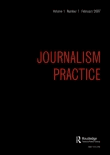
Journalism Practice
Navigating the Intersection of Tradition and InnovationJournalism Practice is a leading peer-reviewed journal that serves as a vital platform for scholars and practitioners in the field of journalism and communication. Published by Routledge Journals under Taylor & Francis Ltd, this esteemed journal boasts an impressive impact factor and ranks in Q1 in the Communication category for 2023, highlighting its critical role in advancing knowledge and discourse within the industry. The journal covers the evolving practices, theories, and challenges in journalism and offers insight into the convergence of traditional and new media, having published comprehensive research articles from 2007 to 2013 and continuing from 2015 through 2024. Residing in the top 87th percentile in Social Sciences Communication (ranked #63 out of 511 in Scopus), Journalism Practice provides a rich source of information that is invaluable for researchers, professionals, and students seeking to engage with the latest developments in journalism. Although it is not an open-access journal, its curated content is essential for those committed to understanding and shaping the future of journalism.

Media International Australia
Elevating Understanding of Media's Societal ImpactMedia International Australia is a leading journal that occupies a unique position at the intersection of communication and cultural studies. Published by SAGE Publications Ltd, this journal has established itself as a vital platform for scholarly discourse since its inception, now converging efforts from 2008 to 2024. With an impressive Q1 ranking in both the Communication and Cultural Studies categories, it ranks 12th out of 1304 in Cultural Studies and 42nd out of 511 in Communication, placing it within the 99th and 91st percentiles respectively according to Scopus metrics. The journal is committed to providing access to rigorous research that reflects contemporary issues in media, making it essential reading for researchers, professionals, and students keen on advancing their understanding of media's role in society. Despite not being fully Open Access, it ensures that quality research remains accessible through institutional subscriptions, allowing a broad audience to benefit from its insightful contributions.
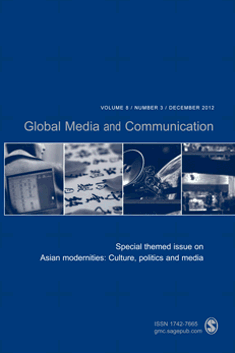
Global Media and Communication
Pioneering Scholarly Discourse in Global Media StudiesGlobal Media and Communication is a premier journal dedicated to advancing the fields of media and communication studies, published by SAGE Publications Ltd. With an ISSN of 1742-7665 and an E-ISSN of 1742-7673, this journal offers a platform for scholarly discourse and innovative research that explores the intricate relationships between global media practices and communication strategies. Recognized as a Q1 journal in both the Arts and Humanities (Miscellaneous) and Communication categories for 2023, it stands out in its commitment to delivering high-quality, peer-reviewed articles that contribute to the understanding of contemporary media landscapes. Located in London, United Kingdom, the journal benefits from being at the heart of cultural and digital innovation. Researchers, professionals, and students can look forward to insightful articles that not only critique existing frameworks but also propose new methodologies, ensuring that Global Media and Communication remains a vital resource for anyone interested in navigating the evolving dynamics of media and communication on a global scale.

Pacific Journalism Review
Connecting Voices, Cultures, and Ideas in Journalism.The Pacific Journalism Review, published by the Auckland University of Technology’s Creative Industries Research Institute, stands as a pivotal platform for scholarly discourse in the field of journalism and communication, particularly within the Pacific region. With an ISSN of 1023-9499 and an E-ISSN of 2324-2035, this journal has embraced Open Access since 2016, thereby enhancing accessibility and dissemination of research findings. Located in Auckland, New Zealand, it has been a critical outlet for innovative research and analysis from 2005, converging onto the contemporary landscapes of media practices through 2024. Featuring a 2023 Scopus ranking of #211 in the field of Communication, placing it in the 58th percentile, this journal is recognized for its significant contributions to the academic community, evident from its classification in the Q3 quartile. Aimed at researchers, professionals, and students alike, the Pacific Journalism Review not only enriches the discourse in communication studies but also shapes the future narratives of journalism in the Pacific and beyond.
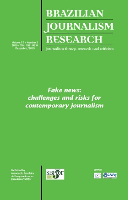
Brazilian Journalism Research
Advancing Knowledge in Communication StudiesBrazilian Journalism Research is a leading platform in the field of communication studies, focusing on the dynamic landscape of journalism in Brazil and beyond. Published by SBPJOR, this open-access journal has been committed to scholarly dissemination since 2005, facilitating a diverse array of research that informs both academic and professional practices. With an ISSN of 1808-4079 and an E-ISSN of 1981-9854, the journal explores critical issues within journalism, including media practices, policy analysis, and the social implications of news dissemination. Recognized in the Q3 quartile of Communication as per 2023, it ranks 324 out of 511 in the Scopus social sciences communication category, highlighting its growing reputation amidst an evolving field. The journal's commitment to quality research is further exemplified through its converged years from 2018 to 2024, which enables it to analyze contemporary trends and future directions. Researchers, professionals, and students alike are encouraged to access this journal to enrich their understanding and engagement with Brazilian journalism scholarship.

Connectist-Istanbul University Journal of Communication Sciences
Bridging Disciplines, Enhancing UnderstandingConnectist-Istanbul University Journal of Communication Sciences is a distinguished academic publication under the auspices of Istanbul University, Faculty of Communication, dedicated to advancing the field of communication studies. Since its inception, this Open Access journal has facilitated the dissemination of groundbreaking research and innovative methodologies, particularly since it embraced an open access model in 2017, promoting wider accessibility and engagement. As a pivotal resource for researchers, practitioners, and students alike, Connectist fosters interdisciplinary dialogue, exploring contemporary issues in communication, media studies, and related disciplines. With a commitment to rigorous peer review and scholarly excellence, the journal serves as an essential platform for cutting-edge insights and developments in communication sciences, thereby contributing significantly to the academic community and beyond.
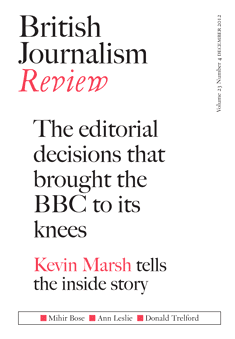
British Journalism Review
Fostering Academic Rigor in Journalism StudiesBritish Journalism Review is a distinguished academic journal dedicated to the exploration and analysis of the rapidly evolving field of journalism. Published by SAGE Publications Ltd, this journal plays a critical role in disseminating high-quality research that addresses key issues facing journalists and media organizations today. With an ISSN of 0956-4748 and an E-ISSN of 1741-2668, it is a pivotal resource for scholars, practitioners, and students alike. Although the journal does not currently offer Open Access options, it maintains a strong commitment to academic rigor and innovation in journalism studies. By engaging with a diverse range of topics such as media ethics, the impact of digital technologies, and the changing landscape of news consumption, the British Journalism Review remains instrumental in shaping contemporary debates and enhancing the scholarly discourse in its field.